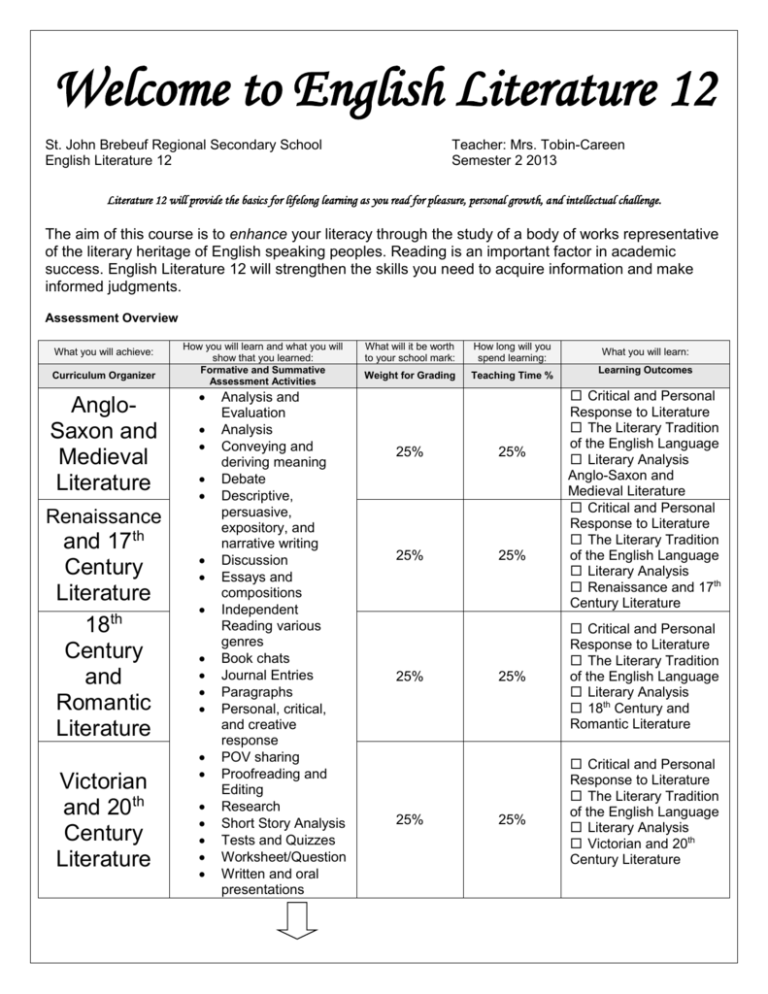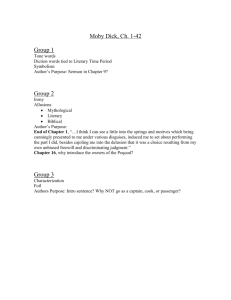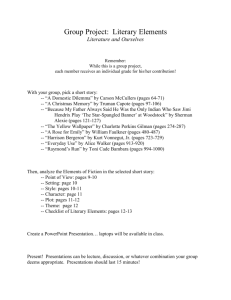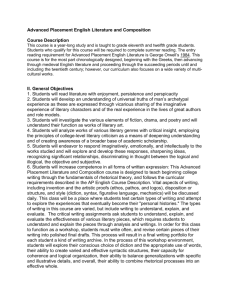LIT12 overview 201
advertisement

Welcome to English Literature 12 St. John Brebeuf Regional Secondary School English Literature 12 Teacher: Mrs. Tobin-Careen Semester 2 2013 Literature 12 will provide the basics for lifelong learning as you read for pleasure, personal growth, and intellectual challenge. The aim of this course is to enhance your literacy through the study of a body of works representative of the literary heritage of English speaking peoples. Reading is an important factor in academic success. English Literature 12 will strengthen the skills you need to acquire information and make informed judgments. Assessment Overview What you will achieve: Curriculum Organizer AngloSaxon and Medieval Literature How you will learn and what you will show that you learned: Formative and Summative Assessment Activities Renaissance and 17th Century Literature 18th Century and Romantic Literature Victorian and 20th Century Literature Analysis and Evaluation Analysis Conveying and deriving meaning Debate Descriptive, persuasive, expository, and narrative writing Discussion Essays and compositions Independent Reading various genres Book chats Journal Entries Paragraphs Personal, critical, and creative response POV sharing Proofreading and Editing Research Short Story Analysis Tests and Quizzes Worksheet/Question Written and oral presentations What will it be worth to your school mark: How long will you spend learning: Weight for Grading Teaching Time % 25% 25% 25% 25% 25% 25% 25% 25% What you will learn: Learning Outcomes Critical and Personal Response to Literature The Literary Tradition of the English Language Literary Analysis Anglo-Saxon and Medieval Literature Critical and Personal Response to Literature The Literary Tradition of the English Language Literary Analysis Renaissance and 17th Century Literature Critical and Personal Response to Literature The Literary Tradition of the English Language Literary Analysis 18th Century and Romantic Literature Critical and Personal Response to Literature The Literary Tradition of the English Language Literary Analysis Victorian and 20th Century Literature Summative Assessment Type Contribution of marks to the unit Literary Analysis Essays 30 Read With Me 20 Review Duotang and Card Contribution 20 Class work including presentations/small group led discussion/student- 30 teacher conferences/ Critical and Personal Response to Literature In keeping with best practice, we will encounter a variety of formative and summative assessment activities. Formative assessment practices will be recorded anecdotally; summative assessment will be entered as a numeric value. Materials: Students are required to bring the following to class everyday Binder with 4 dividers labeled: -Anglo-Saxon and Medieval -Renaissance and 17th Century -18th Century and Romantic -Victorian and 20th Century Pens (blue, black, one highlighter, a pencil, and eraser) ruler, glue stick, colouring utensils, notecards Required texts/readings/handouts Dictionary Electronic or Paperback One duo tang to be labeled Reading Review Independent Study Materials…upon request!!! Classroom Expectations Respect -Who? Your classmates, your teacher, yourself -What? Your classroom, your school, materials Responsibility -Be prepared for all classes/bring materials -After an absence, you are required to catch up on all work -Submit your work -If you miss a test or presentation you must make it up School Rules -Follow all school policies -Please no gum, drink, or food in class -Discourage locker/washroom breaks during class time IP and Rewrite Policies Retests and rewrites are only to be arranged between the teacher and the student. Students must first complete a “qualifier” before the rewrite privilege will be granted. There will be no rewrites for minor written assignments, class presentations, creative projects, and or quizzes. This policy does not impede any formative assessment practices, where editing, proofreading, and guided revision are the expectation not the exception! Literature 12 St. John Brebeuf Regional Secondary School Mrs. Tobin-Careen "Read with Me" Project For this parallel reading, you must find an adult who will agree to read the same book as you. You and your partner will read the book and then rate it according to a system you (the student) have devised. Next, you will both write a review of the book. Finally, you will make a presentation of the book incorporating both reviews and ratings. Here are the steps: 1. Begin by finding a reading partner-a parent or other adult relative is ideal, but consider other adults as well ( a priest or church group leader, a coach, a neighbour, a teacher, or coworker). Then select a book to read. 5%. The adult can be active in the book selection, or you can decide which book you'd like to read. Turn in the name of the adult who is your reading partner and the title of the book you have decided upon. 2. After the completion of the book, two reviews are written: one by your adult reading partner and one by you, the student. Your review counts for twice as much as your reading partner's review because it 60% will be graded for grammar and composition skills as well as content. Basically, you will get the points for your partner's review simply by it being in the project! 3. The reviews are attached to poster board to make a visual display. The poster should be divided into three parts: on the left is your reading partner's review and rating; in the center is the bibliographic information and a mock-up of the original cover design of the book; 25%on the right is your review and rating. You must devise a rating system for you and your partner that is pertinent to your book-5 stars or "thumbs up/down is not acceptable. Be ingenious! 4. The final step is an oral presentation of the poster and the book. Your reading partner is clearly welcome to participate in this part of the 10%project, but his or her presence is not required. Please note that your responsibility is to read the book, develop a rating system, write your review, create your presentation, and present it to the class. Your deadline is _________________________________________________. Hopefully , Your reading partner will have his or her part of the project completed and ready to go on time; however, whether or not that review is completed, yours must be turned for evaluation. Specified Readings List Anglo-Saxon and Medieval from Beowulf Geoffrey Chaucer, from The Canterbury Tales, “The Prologue” “Bonny Barbara Allan” from Sir Gawain and the Green Knight Renaissance and 17th Century Sir Thomas Wyatt,“Whoso List to Hunt” Christopher Marlowe,“The Passionate Shepherd to His Love” Sir Walter Raleigh,“The Nymph’s Reply to the Shepherd” William Shakespeare, Sonnet 29 (“When in disgrace with fortune and men’s eyes”) Sonnet 116 (“Let me not to the marriage of true minds”) Sonnet 130 (“My mistress’ eyes are nothing like the sun”) Hamlet, King Lear or The Tempest John Donne,“A Valediction: Forbidding Mourning”; “Death, Be Not Proud” Robert Herrick, “To the Virgins” John Milton,“On His Blindness” Paradise Lost from The Diary of Samuel Pepys 18th Century and Romantic Lady Mary Chudleigh, “To the Ladies” Alexander Pope, from The Rape of the Lock Jonathan Swift, “A Modest Proposal” Robert Burns, “To a Mouse” William Blake, “The Tiger”; “The Lamb” Thomas Gray,“Elegy Written in a Country Churchyard” William Wordsworth, “My Heart Leaps Up”; “The World Is Too Much with Us” Samuel Taylor Coleridge,“The Rime of the Ancient Mariner” George Gordon, Lord Byron,“Apostrophe to the Ocean” Percy Bysshe Shelley,“Ode to the West Wind” John Keats, “Ode to a Nightingale”; “When I Have Fears That I May Cease to Be” Victorian and 20th Century Alfred, Lord Tennyson, “Ulysses” Elizabeth Barrett Browning, Sonnet 43(“How do I love thee? Let me count the ways”) Robert Browning,“My Last Duchess” Emily Brontë, “Song” Matthew Arnold, “Dover Beach” Thomas Hardy, “The Darkling Thrush” Emily Dickinson,“Because I Could Not Stop for Death” Wilfred Owen, “Dulce et Decorum Est ” William Butler Yeats,“The Second Coming” T.S. Eliot, “The Hollow Men” Dylan Thomas,“Do Not Go Gentle into That Good Night” Stevie Smith, “Pretty” Margaret Atwood,“Disembarking at Quebec” Literature 12 Mrs. Tobin-Careen Author Profiles Literary Deck Assigned February 4, 2013. Create an author profile for _____ of the following on card stock(colour coding would be a great idea), in the style of a "baseball/hockey card" (8 ½ X 11)including… birth/death...education...travel...love... political work...works...childhood...writing partners...addictions...period...style...theme...content...diction...form...photo...other interesting facts....Each completed card is worth __ marks! Classical /Medieval from Beowulf from Canterbury Tales Bonnie Barbara Allan Gawain and the Green Knight Renaissance/17th century Sir Thomas Wyatt Christopher Marlowe Sir Walter Raleigh William Shakespeare John Donne Robert Herrick John Milton Pepys 18th Century andRomantic Lady Mary Chudleigh Alexander Pope Jonathan Swift Robert Burns Dylan Thomas William Blake Thomas Gray William Wordsworth Samuel Taylor Coleridge George Gordon, Lord Byron Percy Bysshe Shelley John Keats Victorian andTwentieth Century Alfred Lord Tennyson Elizabeth Barret Browning Robert Browning Matthew Arnold Thomas Hardy Emily Bronte Emily Dickinson T.S. Eliot Wilfed Owen William Butler Yeats Margaret Atwood Stevie Smith English Literature 2012 To the Parents/Guardians of ___________________________________________(child’s name) Please review all of the information on this outline with your child. If there are any questions or concerns, please feel free to contact me, Mrs. Tobin-Careen @ 855 0571. email: stobincareen@stjohnbrebeuf.ca DVD/ Video Clips that we may be viewing as part of our units of study: -Pride and Prejudice -13th Warrior (Mead Hall Entrance) -Hamlet -Othello -Knight’s Tale Please sign this sheet indicating your acknowledgment of these policies. _________________________ Parent/Guardian Signature __________________ Date









